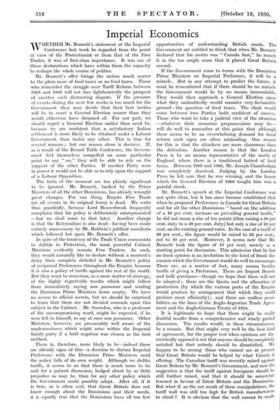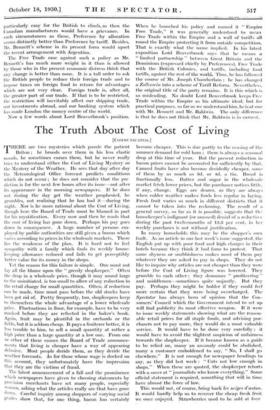Imperial Economics
WHETHER Mr. Bennett's statement at the Imperial Conference last week be regarded from the point of view of the Protectionist or from that of the Free Trader, it was of first-class importance. It was one of those declarations which have within them the capacity to reshape the whole course of politics.
Mr. Bennett's offer brings the nation much nearer to the plain issue of food taxes or no food taxes. Those who remember the struggle over Tariff Reform between 1908 and 1906 will not face lightheartedly the prospect of another such distracting dispute. If the pressure of events during the next few weeks is too much for the Government they may decide that their best tactics will be to court a General Election sooner than they would otherwise have dreamed of. For our part, we should regret a General Election earlier than need be, because we are confident that a satisfactory Indian settlement is more likely to be obtained under a Labour Government than under any other. This is true for several reasons ; but one reason alone is decisive. If, as a result of the Round Table Conference, the Govern- ment feel themselves compelled on some particular point to say " no," they will be able to rely on the support of the other Parties. If another Party were in power it would not be able so to rely upon the support of a Labour Opposition.
The facts of the moment are too plainly significant to be ignored. Mr. Bennett, backed by the Prime Ministers of all the other Dominions, has already wrought great changes. For one thing, Empire Free Trade (at all events in its original form) is dead. We write thus guardedly, because Lord Beaverbrook frequently complains that his policy is deliberately misrepresented —but we shall come to that later. Another change is that the Referendum is also dead—having been made entirely unnecessary by Mr. Baldwin's jubilant manifesto which followed hot upon Mr. Bennett's offer.
In spite of the tendency of the Trade Union economists to dabble in Protection, the most powerful Cabinet Ministers evidently remain Free Traders. As such, they would naturally like to declare without a moment's delay their complete disbelief in Mr. Bennett's policy of reciprocal Preferences throughout the Empire, because it is also a policy of tariffs against the rest of the world. But they must be conscious, as a mere matter of strategy, of the highly regrettable results which might follow from immediately saying non possumus and sending the Dominion Prime Ministers home empty. We have no access to official secrets, but we should be surprised to learn that there are not divided counsels upon this subject in -the Cabinet. Mr. Snowden, who is a professor of the uncompromising word, might be expected, if he were left to himself, to say at once non possumus. Other Ministers, however, are presumably well aware of the unpleasantness which might arise within the Imperial family party if a bald negation was chosen as the best method.
There is, therefore, more likely to be—indeed there are already signs of this—a decision to discuss Imperial Preference with the Dominion Prime Ministers until the policy falls of its own weight. Although we dislike tariffs, it seems to us that there is much more to be said for a patient discussion, hedged about by as little prejudice as may be, than for any other policy which the Government could possibly adopt. After all, if it is true, as is often said, that Great Britain does not know enough about the Dominions and their needs, it is equally true that the Dominions have all too few opportunities of understanding British needs. The Government are entitled to think that when Mr. Bennett declared that his motto was " Canada first," he meant it in the too ample sense that it placed Great Britain second.
If the Government come to terms with the Dominion Prime Ministers on Imperial Preference, it will be a miracle. But in any attempt to predict the future, it must be remembered that if there should be no miracle the Government would be by no means inconsolable. They would then approach a General Election upon what they undoubtedly would consider very favourable ground—the question of food taxes. The clash would come between two Parties both confident of success. Those who want to take a judicial view of the situation —whatever their economic prepossessions may be— will do well to remember at this point that although there seems to be an overwhelming demand for fiscal reform such signs are often misleading. One reason for this is that the attackers are more clamorous than the defenders. Another reason is that the London Press is by no means representative of the north of England, where there is a traditional hatred of food taxes. Between 1903 and 1906, Mr. Joseph Chamberlain was completely deceived. Judging by the London Press he felt sure that he was winning, and the lesson which the General Election of 1906 taught him was a painful shock.
Mr. Bennett's speech at the Imperial Conference was not quite clear, but it has since become established that when he proposed Preferences in Canada for Great Britain and for all the other Dominions " based on the addition of a 10 per cent. increase on prevailing general tariffs," he did not mean a rise of ten points (thus raising a 30 per cent. duty to a 40 per cent. duty) but only a rise of 10 per cent. on the existing general rates. In the case of a tariff of 30 per cent., the figure would be raised to 33 per cent., not to 40 per cent. Moreover, it seems now that Mr. Bennett took the figure of 10 per cent. merely as a starting point for discussion. This admission that he has no fixed opinion is an invitation to the kind of frank dis- cussion which the Government would do well to encourage. There are, as a matter of fact, many means besides tariffs of giving a Preference. There are Import Boards and bulk purchases—though we hope that these will not be adopted ; there are the Quota and the allocation of production (by which the various parts of the Empire would produce by arrangement that which they could produce most efficiently) ; and there are endless possi- bilities on the lines of the Anglo-Argentine Trade Agree- ment and the Anglo-German Treaty of 1924.
It is legitimate to hope that there might be really fruitful results from a comprehensive and wisely guided discussion. The results would, in these circumstances, be a mosaic. But that might very well be the best kind of agreement, for the proper test when opinions are dia- metrically opposed is not that anyone should be completely satisfied but that nobody should be dissatisfied. We happen to be among those who cannot see at present that Great Britain would be helped by what Canada is offering. The Canadian tariff was recently raised against Great Britain by Mr. Bennett's Government, and now the suggestion is that the tariff against foreigners should be still further raised, and that it should be somewhat lowered in favour of Great Britain- and the Dominions. But what if, as the net result of these manipulations, the tariff wall was still too high for British manufacturers to climb ? It is obvious that the wall cannot be made
particularly easy for the British to climb, as then the Canadian manufacturers would have a grievance. In such circumstances as these, Preference by allocation seems distinctly better than Preference by tariff. Besides, Mr. Bennett's scheme in its present form would upset the recent arrangement with Argentina.
The Free Trade case against such a policy as Mr. Bennett's has much more weight in it than is allowed by those who in the present economic distress think that any change is better than none. It is a tall order to ask the British people to reduce their foreign trade and to impose taxes on foreign food in return for advantages which are not very clear. Foreign trade is, after all, the greater part of our trade. If that is to be restricted, the restriction will inevitably affect our shipping trade, our investments abroad, and our banking system which has made London the money centre of the world.
Now a few words about Lord Beaverbrook's position. When he launched his policy and named it " Empire Free. Trade," it was generally understood to mean Free Trade within the Empire and a wall of tariffs all round the Empire protecting it from outside competition. That is exactly what the name implied. In his latest exposition Lord Beaverbrook says that he means a " limited partnership " between Great Britain and the Dominions (expressed chiefly by,Preferences), Free Trade with the British Colonies, and tariffs, including food tariffs, against the rest of the world. Thus, he has followed the course of Mr. Joseph Chamberlain ; he has changed a Zollverein into a scheme of Tariff Reform. Nevertheless, the original title of the party remains. It is this which is so misleading. No doubt Lord Beaverbrook keeps Free Trade within the Empire as his ultimate ideal, but for practical purposes, so far as we understand him, he is at one with Mr. Bennett and Mr. Baldwin. The only difference is that he does not think that Mr. Baldwin is in earnest.

























































 Previous page
Previous page